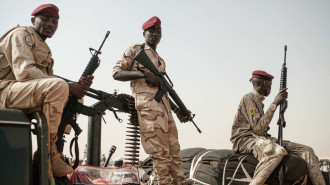Moroccan journalist sentenced to prison for 'illegal abortion'
Hajar Raissouni, was arrested on 31 August along with her fiancé Amin Rifaat, as they left a doctor’s office in Rabat. The doctor and two others working at the clinic were also arrested on suspicion of carrying out an abortion.
Hajar Raissouni and Amin Rifaat were both sentenced to one year in prison. The doctor involved in the case was sentenced to two years in prison and banned from practising for two years. There were two other members of medical staff convicted, one received a prison sentence of one year and the other a prison sentence of eight months.
Lawyers for 28-year-old Raissouni had called for her acquittal during the trial, denying she had had an abortion.
"This trial had no foundation - the accusations were baseless," said defence lawyer Abdelmoula El Marouri after the verdict.
A journalist for Akhbar Al-Yaoum - an Arabic-language newspaper which has a history of run-ins with the authorities - Raissouni was sentenced under Article 490 of the legal code of the Muslim kingdom.
That article punishes sexual relations out of wedlock, while the law also forbids all abortions unless the mother's life is in danger.
Meriem Moulay Rachid, lawyer for the convicted gynaecologist, said: "The judicial system has had its word, (but) we will appeal."
Relatives of Raissouni also told AFP that they would appeal.
Raissouni had appeared serene when arriving at the courtroom, wearing a black veil covering her head.
She waved to her relatives before taking her place in the dock.
In court, she denied having had an abortion and said she had been treated for internal bleeding - testimony backed up by her gynaecologist.
The prosecution insisted she had been seen by a medic and showed signs of pregnancy and of having undergone a "late voluntary abortion".
It had contended her detention had "nothing to do with her profession as a journalist".
The reporter herself said she had been "forced into a medical examination without her consent".
Her lawyers said that medical examination was a "humiliation tantamount to torture", while they also pointed to "judicial police failures" and "fabricated evidence".
In a letter sent by Hajar to her newspaper, she described how while in custody, she was interrogated about her political writings, one of her colleagues at Akhbar al-Yaoum and family including her uncle Ahmed Raissouni, a prominent theologist and the ex-president of the Mouvement de l'Unicité et de la Réforme (MUR), one of the largest Islamic movements in Morocco.
The case has caused a storm in Morocco, creating debate on personal freedoms in the North African state and on the treatment of critical figures.
It has also received significant attention far beyond the country's borders.
Reporters Without Borders say Raissouni's treatment amounted to "meddling in the private lives of journalists and the use of personal information" with the intent of defamation.
Responding to the news, Amnesty International’s Regional Director for MENA Heba Morayef said:
“Today’s verdict is a devastating blow for women’s rights in Morocco. Hajar Raissouni, her fiancé and the medical staff involved in the case should never have been arrested in the first place.
"Instead of arresting them, publicly slandering Hajar Raissouni, invading her privacy and convicting her on unjust charges, Morocco’s authorities should revoke her conviction and order her immediate and unconditional release as well as the release of all others involved in this case."
Last year, Morocco tried thousands of people for sex out of wedlock, 170 people for being gay and 73 for pregnancy terminations.
"Under international law women have a right to make their own decisions about their sexual and reproductive lives. Criminalizing abortion is a form of discrimination against women. Morocco’s authorities must urgently repeal all laws that violate women’s rights including laws that criminalize sex outside marriage and abortion," Morayef said.
Wire agencies contributed to this news story







 Follow the Middle East's top stories in English at The New Arab on Google News
Follow the Middle East's top stories in English at The New Arab on Google News
![Lebanon after strikes [Getty]](/sites/default/files/styles/image_330x185/public/2184409977.jpeg?h=a5f2f23a&itok=7wpfQMyI)
![G20 Brazil [Getty]](/sites/default/files/styles/image_330x185/public/2184389194.jpeg?h=a5f2f23a&itok=t1DchCMY)
